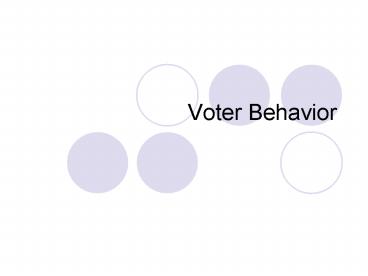Voter Behavior - PowerPoint PPT Presentation
1 / 13
Title: Voter Behavior
1
Voter Behavior
2
Who can vote?
- 1789 Only white male property owners
- 1850 Nearly all white adult males.
- 1870 All men over 21.
- 1920 All men and women over 21.
- 1971 All men and women over 18.
- Todays electorate more than 200 million people.
3
Voter Qualifications
- Reserved Power (for the States).
- Constitution sets 5 restrictions on the States
- If a state allows someone to vote in state
elections they must allow them to vote in
national elections. - No state can stop someone from voting due to
their race, color, or previous condition of
servitude - No state can stop someone from voting because of
their sex. - No state can make people pay a tax in order to
nominate or elect someone to office. - No state can stop someone from voting who is at
least 18 years of age, because of their age.
4
- Citizenship Aliens cant vote, but there is
nothing in the constitution to stop them. States
could allow this. - Only Minnesota requires a naturalized citizen be
an American citizen for 3 months before they can
vote. Other states allow voting directly after
naturalization. - Residence Most states require that you live in
the State for some period of time before you can
vote. - 10 50 days. Most states require 30 days.
- Keeps the political machine from bribing
outsiders to vote in local elections. - Voters need time to become familiar with the
candidates issues of that state. - Age 26th Amendment 18 yrs. Is the minimum
voting age. - In many states if you will be 18 by the general
election you can vote in the primaries at 17! - Registration All but N. Dakota require voter
registration. - voter identification to prevent fraud. Give
election officials a list of people qualified to
vote. - Some feel this should be done away with stops
people from voting. - Motor Voter Law made it easier to register.
- In IL Oct 5 was the last day to register. WI
allows registration even on election day.
5
Who cannot vote?
- People in Mental Institutions.
- People found to be mentally incompetent.
- People who have been convicted of serious crimes.
- In a few states those dishonorably discharged
from the armed forces. - In some states vagrants, polygamists, duelists.
6
Nonvoting
- The word Idiot derives from the Greek word
idiotes citizens who did not vote or take
part in public life in ancient Greece.
7
Voter Turnout
8
- Approximately 100,000 people choose note to vote
in presidential elections. There are more who do
not vote in off-years. - Voting takes place every 2 years for Congressmen
only ever 4 years for president.
9
Why people dont vote.
- Cannot vote resident aliens, mentally ill, in
prison, physically ill, physically disabled,
traveling unexpectedly, religious beliefs prevent
it, discrimination, etc. - Think their vote wont make a difference.
- Satisfied with the world and think things will
always continue the way they are. - Distrust of politics and politicians.
- No political efficacy (lack of understanding
their own influence or effectiveness in politics) - To difficult to vote
- Difficult to register, ballots are too long, long
lines at polling places, bad weather
10
- Time Zone Fallout
- Polls on the east coast close before those on the
west coast. - Media predicts the winner before voters in the
west have gone to the polls and some find this
discouraging. - Lack of interest apathy
11
Who votes? Who doesnt?
- Regular Voters
- higher income levels higher job status
- higher education levels
- integrated into community life long time
residents - Strong party identification
- Strong political efficacy
- Nonvoters
- Younger than 35
- Unmarried
- Unskilled
- Southern or Rural dwellers
- Opposite of above.
12
Voter Behavior
- Sociological Factors (the influence of society at
large) - Income, Occupation
- Upper-income brackets Republican
- Lower income brackets Democratic
- Education
- Those with more education used to vote Republican
it is becoming more and more even. - Gender/Age
- Since 1980 Women are less likely to vote
Republican. - Younger voters tend to vote Democratic.
- Religious, Ethnic Background
- Northern Protestants Republican
- Catholics and Jews Democratic
- Nonwhite Democratic
- Hispanic Puerto Rican Democratic
- Cuban Republican
- Geography
- Urban Democratic
- Suburban Rural Republican
- Family group affiliations
13
Psychological Factors
- Party Identification
- Loyalty to one party may cause one to do straight
ticket-voting - This may be weakening as there is more
split-ticket voting (began to increase in the
1960s) - Also many claim to be Independents
- Candidates and Issues
- Impressions made by candidates on voters
- Projected image personality, character, style,
appearance, past record, abilities, etc. - Issues increasingly important over the past 30
years. - Civil Rights, Vietnam War, Watergate Scandal,
social economic problems































